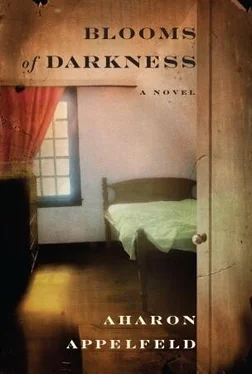Sometimes she asks Hugo to mop the floor and clean the bathroom. The room that he continues to call “Mariana’s room” has changed beyond recognition. It is without pictures, without the little decorative bottles on the dresser, and without the small marks of carelessness that indicate poor housekeeping.
The short time Hugo spends in Mariana’s room, no longer free and on his own but as a servant, reminds him of Mariana’s open face and of the nights he lay close to her. Sharp longings fill him. The day before, Nasha told him, “You have to tidy up the closet. You mustn’t live in such disorder.” Most of the objects in the closet are Mariana’s clothes: robes, dresses, blouses, shoes, corsets, brassieres, and silk stockings. Mariana’s clothes are also her. They continue to breathe without her in the thin darkness of the closet.
Every piece of clothing gives her a different form. The colorful garments brighten her face and arouse the joy that was in her. The gray and black clothes add gloom to her gloom. More than once she complained about the corsets and brassieres that constricted her. She used to stretch her leg forward while putting on her silk stockings, a gesture he loved from the first time he saw it. There are clothes she hadn’t worn for a long time, and the odors have faded from them. But most of the clothes retain the smells of her body. Hugo brings them up to his nostrils, and Mariana’s full being comes to life.
For a long time he sits and sorts. If there were a cupboard, he could arrange the clothes on shelves, but since there isn’t one, he places them folded on the bench.
Hugo shows the arrangement to Nasha, and she’s pleased. But her satisfaction isn’t enthusiastic. When she’s pleased, she says, “Acceptable” or “Fine.” Unlike Mariana, she guards her emotions and doesn’t reveal them. When Hugo compliments her clothes or her hairdo, she isn’t moved but says, “Nice of you to notice.”
One evening she turns to Hugo and says, “I have a request of you. Help me cut my toenails. It’s hard for me to cut them and hard for me to put polish on them.”
Hugo is surprised. He didn’t imagine she would address such a request to him. “With pleasure,” he says.
Nasha’s feet and ankles are pretty and delicate, and he cuts her toenails carefully and gently, as she instructs him.
“In our profession, our feet are the front,” she says with a guarded smile. Hugo doesn’t understand the exact meaning of that sentence. The contact with her, in any event, gives him no pleasure, maybe because she doesn’t thank him but says, “Very good,” and immediately adds, “Beyond the demands of the profession, it’s a good idea to look presentable. Did your parents insist on looking well?”
“My parents are pharmacists.”
“Untidiness drives me crazy, and here no one insists on order and cleanliness.”
“Why?” Hugo asks carelessly.
“Because everybody is only concerned with himself.”
That night he hears one of the guests say, “Now there are no more Jews here. They’ve all reached their destination, and we’ll pull out those who are in hiding one by one. We managed to cleanse the region of Jews. Now it’s possible to breathe.”
“Have they all gone away?” asks Nasha.
“Without an exception.”
“And now there won’t be any more Jews?”
“We did our duty, once and for all.”
Hugo understands most of what the man says, and what he doesn’t understand, he guesses. But he consoles himself with the thought that his mother is hiding in a distant, unknown village. There her childhood friend is watching over her, the way Mariana and Nasha are watching over him.
In the morning, Hugo awakens in a panic: Mariana’s room is in an uproar. It’s hard to know what the commotion is about. For a moment it seems to him that soldiers are making searches, and the women are trying to block their way to the closet. Hugo gets to his feet and is about to slip out through the opening alongside the toilet. Meanwhile, the commotion becomes weeping. From the weeping arises Nasha’s name.
Hugo hears, and his body shrinks. For a long time the weeping continues, but gradually it goes somewhere else. A few women remain in the corridor and speak with strange practicality. From what they say he understands that a disaster has befallen Nasha. They don’t talk about its nature.
Hugo sits in his place and sees before him Nasha’s long, white legs and the toenails he trimmed and painted with nail polish. He had noticed then that, unlike Mariana, Nasha didn’t bare her legs easily. It was as though she was afraid of being hurt. All the while Hugo was cutting her nails, she bit her lower lip, and when he finished putting on the nail polish, she folded her legs with a motion that showed fear of pain that might come.
Later he hears one of the women say breathlessly, “After she finished her work, she left her room. She was wearing a warm coat, her hair was neat, she was wearing makeup, and she showed no sign of anything bad to come. The guard was sure she was going to town to visit her cousin and buy a package of chocolates in the bakery, the way she sometimes did.”
“Still, who witnessed her drowning?” the woman is asked.
“A fisherman. He saw her jump into the water and tried to pull her out, but he didn’t manage to. The current was too strong.”
“Where is she now?”
“Have you any more questions like that?” the woman replies angrily.
Suddenly the voice of another woman is heard. She speaks deliberately but not without emotion, telling how Nasha had begun to work there more than a year earlier, and how she had adapted to the place. “A modest woman and loyal to her friends. If a friend didn’t feel well, or needed help, Nasha was the first one to help her. She helped without expecting anything in return. She never said, I gave to you, I helped you, you’re ungrateful.
“Her grandfather was a priest, and she apparently inherited her virtues from him. She never complained, not about her friends and not about the clients. She suffered in silence, with nobility. She didn’t go to church, but God was in her heart. Too bad we didn’t know how to watch over her. She gave to everyone, and no one gave anything to her.”
“Why did she take her own life?”
“She was apparently very lonely. Lonelier than the rest of us. She never spoke about her parents or about her sisters. She always mentioned her grandfather. She would say, ‘A man of God in the full sense of the word.’ ”
“And did she have guilt feelings?”
“I guess so, but she never talked about it. She was very restrained. Once she said to me, ‘What won’t people do to earn a living?’ She didn’t express disgust or revulsion, the way we all do. She did her work every day without complaining about headaches or stomachaches. More than once I said to myself, Nasha is strong, she’s contemptuous of us . It turns out I was wrong.”
Hugo hears the voices, and as he listens, he sees the rushing water envelop her pure legs. What will be, and how will his life proceed from now on? He doesn’t know. He imagines that toward evening Nasha will surprise everyone and stand in the doorway, saying, The fisherman was wrong. It wasn’t me. Here I am standing before you . In the end she will tell them, I was in Grandpa’s church, and I went up to his grave. He took me in his open arms and called me “my daughter.”
Thus Hugo sits in the corner and dreams. Meanwhile, The Residence returns to its ordinary pace. The regular questions are asked, and the regular answers come in their wake. Suddenly an older woman’s voice is heard: “How much should I make?”
“Thirty portions, no more.”
Читать дальше












